(!)NOTE : Windows 7 users won’t be able to use some latest features of eCatalog/WOS since Microsoft is ending support for Windows 7 on 14 Jan, 2020. Please upgrade your system for uninterrupted services.
- Please note that the MISUMI Pune office and warehouse will be closed on November 20th due to the state election.
- Notice of End of Sales for Economy Series Pneumatic Equipment Category. More information.
Air Cylinders(Additional Function:With Cylinder Thrust Force Doubling Function)
Search by specifying the lower class category
Brand |
|
|---|---|
| CAD |
|
| Days to Ship |
|
2 items
- Sort By
-
You can add up to 6 items per a category to the compare list.
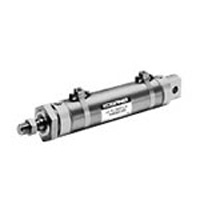
General Type, Slim Cylinder, DA/DV/SA Series
KOGANEI
Slim cylinder of ø16 to 63 (cylinder diameter 16 to 63 mm).
[Features]
·High quality and highly reliable design using stainless steel tube is standard for compact and medium cylinders
·A wide variety of lineup of 21 variations in all
·Supports high-speed operation of 700 mm/s (ø50, 63 (cylinder diameter 50, 63 mm) is 500 mm/s)
·Uses durable piston packing
·Sensor switch can be retrofitted
·High mounting accuracy and easy mounting work
[Applications]
・ Compatible with pneumatic equipment and production lines in all industriesCylinder I.D: D(Ø) Stroke: L(mm) Rod Operation Method Main Body Shape Cylinder Operation Method Additional Function Environment, Applications 20 ~ 40 25 ~ 150 Single-Rod Standard Double Acting With Cylinder Thrust Force Doubling Function Standard From: ₹ 9,656.64 Days to Ship: 13 Day(s) or more  13 Day(s) or more
13 Day(s) or more
-
You can add up to 6 items per a category to the compare list.
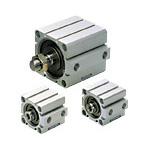
KOGANEI
Rich series configuration available from ø 6 to ø 100. Standard non-ion specification.
Cylinder I.D: D(Ø) Stroke: L(mm) Rod Operation Method Main Body Shape Cylinder Operation Method Additional Function Environment, Applications 12 ~ 63 5 ~ 75 Single-Rod Block Shape Double Acting / Single Acting (Extension) With Cylinder Thrust Force Doubling Function Standard / Heat Resistant From: ₹ 5,864.70 Days to Ship: 6 Day(s) or more  6 Day(s) or more
6 Day(s) or more
| Brand |
|---|
| Product Series |
| From |
| Days to Ship |
| Cylinder I.D: D(Ø) |
| Stroke: L(mm) |
| Rod Operation Method |
| Main Body Shape |
| Cylinder Operation Method |
| Additional Function |
| Environment, Applications |
You can add up to 6 items per a category to the compare list. | You can add up to 6 items per a category to the compare list. | |
| Brand | KOGANEI | KOGANEI |
| Product Series | ||
| From | ₹ 9,656.64 | ₹ 5,864.70 |
| Days to Ship | 13 Day(s) or more | 6 Day(s) or more |
| Cylinder I.D: D(Ø) | 20 ~ 40 | 12 ~ 63 |
| Stroke: L(mm) | 25 ~ 150 | 5 ~ 75 |
| Rod Operation Method | Single-Rod | Single-Rod |
| Main Body Shape | Standard | Block Shape |
| Cylinder Operation Method | Double Acting | Double Acting / Single Acting (Extension) |
| Additional Function | With Cylinder Thrust Force Doubling Function | With Cylinder Thrust Force Doubling Function |
| Environment, Applications | Standard | Standard / Heat Resistant |
Loading...
Configure
Specification/Dimensions
-
Cylinder I.D: D(Ø)
-
Stroke: L(mm)
-
Rod Operation Method
-
Main Body Shape
-
Cylinder Operation Method
-
Additional Function
- Standard
- High Rigidity, High Precision, High-Grade Guide
- With Fall Prevention Mechanism
- With Brake
- With Intermediate Stop Function
- With Rod Rotation Stopper Function
- With Speed Adjustment Function
- With Cylinder Thrust Force Doubling Function
- With Stroke Adjustment Function
- Dual Stroke
-
Environment, Applications
- Standard
- Low Friction (Internal Resistance)
- High Speed, High Frequency
- Slow Speed
- Heat Resistant
- No Copper, fluoropolymer Type Material (Partially Plated)
Related Categories to Air Cylinders
FAQ Air Cylinders
- Question: What is an air cylinder? How does an air cylinder work?
- Answer: An air cylinder, also known as a pneumatic cylinder, is a mechanical device that uses compressed air to produce a force in a reciprocating linear motion. They are commonly used in various industrial applications for automation, material handling, and machinery. An air cylinder works by introducing compressed air into the cylinder chamber, which forces the piston to move. Depending on the design, the piston can move back and forth, providing linear motion that can be used to perform work such as lifting, pushing, or pulling.
- Question: What are the key specifications of general purpose cylinders?
- Answer: General purpose cylinders come with critical specifications that define their performance. Bore size, representing the internal diameter, directly influences the force output — a larger bore delivers more force but may impact speed. Stroke length, indicating the distance the cylinder travels, is pivotal for ensuring the cylinder can execute the required motion. Operating pressure, the force generated at a specific pressure, is crucial for determining the cylinder's capability.
- Question: How do I select the right cylinder model?
- Answer: Choosing the appropriate cylinder model involves a nuanced assessment. Understanding force requirements is paramount; the cylinder must deliver the necessary force for the application. Environmental factors, such as temperature and exposure to contaminants, should guide the selection. Additionally, considering space constraints ensures the chosen cylinder fits seamlessly into the designated area, with compact models being advantageous in confined spaces.
- Question: What applications do general purpose cylinders serve?
- Answer: General purpose cylinders find versatile applications across industries. In material handling, they play a pivotal role in conveyor systems and robotic arms for efficient movement of items. In clamping applications, these cylinders secure workpieces in fixtures, ensuring stability during various manufacturing processes. Their versatility extends to tasks requiring linear force, making them indispensable in pushing and pulling applications.
- Question: What materials are these cylinders made from?
- Answer: The materials used in general purpose cylinders impact their performance and longevity. Aluminum cylinders, owing to their lightweight nature and corrosion resistance, are ideal when weight is a critical consideration. Stainless steel cylinders, on the other hand, offer durability and corrosion resistance, making them suitable for applications in harsh environments where resilience is paramount.
- Question: What is the importance of cylinder I.D. and stroke length?
- Answer: Cylinder I.D. (Internal Diameter) and stroke length are pivotal considerations in the selection process. A larger I.D. results in more force output, but engineers must balance this with available pressure in system. Stroke length is equally crucial, determining the range of motion the cylinder can achieve. Engineers must ensure that both parameters align with the specific requirements of the task at hand to optimize the cylinder's functionality in the given application.









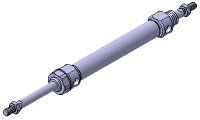




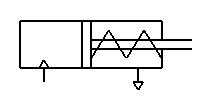
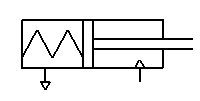



How can we improve?
How can we improve?
Thank you for your time.
Your feedback is essential for our continuous improvement
Privacy Policy
Thank you for your cooperation.
Thank you for your time.
Your feedback is essential for our continuous improvement
Please use the inquiry form.
Privacy Policy